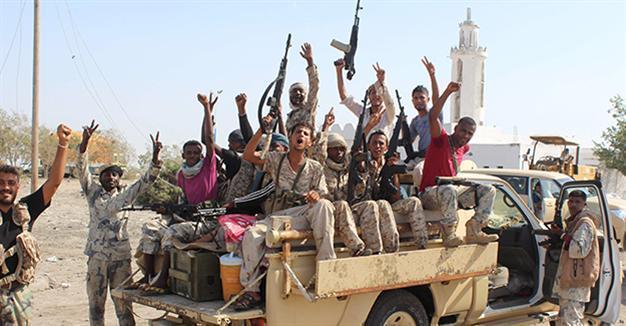Yemen sides appoint ceasefire observers as army fights al Qaeda
KUWAIT/ADEN - Reuters

Forces loyal to the Saudi-backed Yemeni president flash their arms at a road on the entrance to Abyan province as they take part in an operation to drive Al-Qaeda fighters out of the southern provincial capital, on April 23, 2016 - AFP photo
Yemen's government forces battled al Qaeda in the country's south on April 23, aiming to push back advances the militant group has made during a year-long civil war while peace talks take place in Kuwait.Twenty fighters loyal to al Qaeda in the Arabian Peninsula (AQAP) were killed in the clashes, residents and a military source said, while a drone strike killed two others further north.
AQAP has taken advantage of chaos in Yemen since its civil war began last year to win control over swathes of southern and eastern Yemen, creating a local government there and introducing services.
The war pits a collection of local forces and army remnants backed by the government of President Abd-Rabbu Mansour Hadi and a Saudi-led Arab coalition against the Houthi movement and troops loyal to former president Ali Abdullah Saleh.
Representatives gathered in Kuwait on April 21 to begin peace talks after agreeing a ceasefire across the country. The United Nations, which has convened the talks, says around 6,000 people have died in the conflict, half of them civilians.
However, as talks moved into a third day disputes continued over both the agenda and accusations from the government that the Houthis and Saleh's forces had breached the truce in the city of Taiz, a source from Hadi's government said.
The government wants the Houthis and Saleh's forces to release prisoners, withdraw from cities and hand over weapons before discussing a solution to the political disagreements. The Houthis and its allies want coalition air missions to stop and a unity government to be formed before disarmament talks.
The government delegation on April 23 said it would only meet U.N. special envoy Ismail Ould Cheikh Ahmad and not sit directly with the Houthis, the source said. However, later on Saturday Ould Cheikh Ahmad said the sides had agreed to appoint delegates to oversee the ceasefire process, a small step forward.
Ceasefire documents shown to Reuters by the Saudi-led coalition showed agreements for each of Yemen's provinces where fighting was taking place signed by representatives of each side, who had formed committees to monitor the truce.
The clashes on April 23 at al-Koud near Zinjibar in the southern Abyan Province were between AQAP and army forces of Yemen's internationally recognised government backed by local militias, referred to locally as the Popular Resistance.
In recent weeks Hadi's forces, backed by coalition air strikes, have pushed towards Zinjibar along the beach road from Aden. Al-Koud lies on that road only 5 km (3 miles) from Zinjibar, long considered an AQAP stronghold along with the town of Jaar about 15 km to the north.
A group of dozens of AQAP fighters escaped and around 30 were injured and taken to a government hospital, the military source said, adding that two army soldiers were also killed.
Later, a suicide attack on a military post in al-Koud was thwarted when a bomb-laden car was fired on and destroyed, killing the driver, before it reached the sentries, the military source said.
Also on April 23, an air strike from a drone killed two men south of the Yemeni city of Marib suspected of belonging to al Qaeda, local residents said by phone.
The United States has used drone strikes in Yemen to target AQAP leaders, the global jihadist group's local wing, which has plotted to place bombs on international airliners and has encouraged attacks in Western countries.
Officials travelling to Saudi Arabia with U.S. President Barack Obama this week said they hoped moves towards a peace deal in Yemen would allow a renewed focus on challenging AQAP.
















